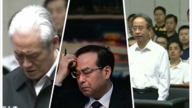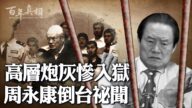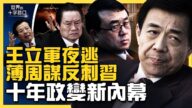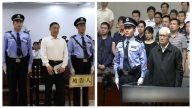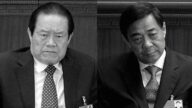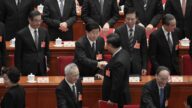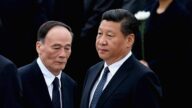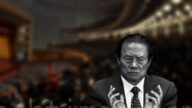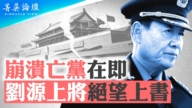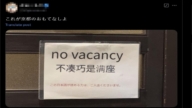【新唐人2014年04月22日讯】四月初,英国《金融时报》报导说,中共当局将在数周内公布前中共政治局常委周永康的案件。如果这样,周永康将成为打破“刑不上常委”惯例的第一人。而美国《纽约时报》最新的报导说,不论是要消灭周永康的影响力,还是要发出一个准确无误的信号给整个共产党官僚,中共领导人习近平看起来想重写规则。
《纽约时报》4月19号报导,习近平瞄准了周永康以及他的家族广泛的商业利益,这使周永康成为中共政治局常委级别被查的第一人。按中共政治游戏规则,这是一个大胆的动作。高级领导人家族的财务是中国最深邃和最敏感的秘密。共产党多年来遵循一个心照不宣的规则,就是高层家属可以从这个国家的经济开放当中发家致富,这是奖赏他们的忠心和避免领导层的裂痕。
不论是要消灭周永康的影响力、还是要发出一个准确无误的信号给整个共产党官僚,习近平看起来想重写规则。他已经扩大了对周永康的调查,包括了他妻子、儿子、兄弟和弟媳、儿媳和儿子的岳父,所有这些人在最近几个月都被当局带走。
《金融时报》4月1号引述知情人士的消息报导说,周永康和许多亲属被共产党调查员拘捕,被关在一个秘密监狱。他们被控腐败的细节将在未来数周后公开。
原中央党校《学习时报》副编审邓聿文之前就预测,周永康案件可能在五、六月宣布。他告诉《新唐人》,这个事情拖得越久,对习近平就越不利。
原中央党校《学习时报》副编审邓聿文:因为案件已经很明朗了。关键是要找到他直接犯罪的证据。如果说一旦找到他直接犯罪的证据,共产党就会公布这个案件。否则你拖下去的话,各种各样的传说是越来越多。而且越拖下去越存在变数。所以说能够公布,他会尽早公布的。
《纽约时报》的报导还说,中共领导人还没有正式谈论有关周永康的腐败调查、或他的亲属的被抓,有关习近平将如何处理案件的终极意向,仍然是一个谜。
一些政治分析家认为,像周永康这个级别的领导人不会面临这种调查,除非习近平认为他是对自己权力的威胁。但是另外一派分析认为,习近平认为官员的子女配偶和兄弟姐妹巨额的敛财,损害了共产党的统治稳定。
邓聿文认为,习近平处理周永康的意图,“反腐保党”和“权力斗争”兼而有之。
邓聿文:“一个是反腐,腐败这么严重的话,如果能够处理周永康的话,就表明习的真心反腐,就会改善共产党在老百姓心目中的形象。第二个目地就是有利于改革。如果把周永康治理了,改革进行不下去就是因为有很多贪官污吏,所以如果能够处理周永康的话,改革相对来说就比较容易推进。第三个目地当然就是,这里面有点权力斗争的味道。谁不听我的话以后就治谁,这样树立个人权威。”
《纽约时报》采访了周永康儿子周滨的岳母。身居美国南加州的詹敏利说,自己的外孙女——周永康的孙女被放到北京的幼儿园,因为周家其他人都被拘禁了,包括周滨夫妇和岳父。
此前有风声说,周永康或许会逃过一劫,而仅仅由周滨承担罪责。但是邓聿文认为,如果只处理周滨,这个事情早就已经处理了,不会拖到现在。
邓聿文:“周永康都打不了,你还打什么腐败啊?事情都已经明摆着。全世界人民都知道,你忽然间不打了,那不说明打不下去吗?打不下去说明你就没有力量嘛。没有力量你还推行什么改革啊?你的改革计划就全部落空了。”
《纽约时报》说,周永康的儿子获得销售国营油田设备和全中国数千个加油站的合同﹔他的亲家母拥有从四川省到海南省的管道和天然气泵股份﹔他的弟媳妇投资矿产、房地产和能源项目。在周永康加入政治局常委之后,周滨控制的“中旭阳光能源科技公司”的资产攀升了六倍,2012年达到2,700万美元。
采访编辑/秦雪 后制/萧宇
Xi Jinping Changes Rules, Investigation on Zhou Yongkang Widens
In early April, the U.K. based Financial Times reported that
the Chinese authorities will announce former Politburo Standing
Committee member Zhou Yongkang’s case later this month.
If so, Zhou’s case will be the first of it’s kind to break the
“untouchable" status for members of the Standing Committee.
The latest New York Times report says CCP leader
Xi Jinping appears to be rewriting the rules by
wiping out Zhou Yongkang’s influence,
and is sending an unmistakable signal to the entire party elite.
New York Times reported on April 19: “President Xi Jinping
has targeted Mr. Zhou in an extraordinary corruption inquiry,
a first for a Chinese party leader of Mr. Zhou’s rank, and put
his family’s extensive business interests in the cross hairs.
Even by the cutthroat standards of Chinese politics,
it is a bold maneuver.
The finances of the families of senior leaders are among
the deepest and most politically delicate secrets in China.
The party has for years followed a tacit rule that relatives of
the elite could prosper from the country’s economic opening,
which rewarded loyalty and helped avert rifts in the leadership."
“Whether to wipe out Mr. Zhou’s influence or to send an
unmistakable signal to the entire party elite, Mr. Xi appears
to be rewriting the rules.
He has widened the inquiry into Mr. Zhou to include his wife,
a son, a brother, a sister-in-law, a daughter-in-law
and the son’s father-in-law, all of whom have been taken away
by the authorities in recent months,
according to relatives and witnesses."
An April 1 Financial Times report says,
“Mr Zhou and his relatives are being held in the kind of
secret prison that security agents under his control sent
people regarded as a threat to the party."
The FT report also says sources familiar with the investigations
say, “Details of their alleged corruption
should be made public in the coming weeks,"
Former deputy editor Deng Yu-Wen of Study Times,
the Central Party School’s weekly journal,
predicts Zhou’s case may be announced in May or June.
He told the NTD that the longer it takes,
the more unfavorable it is for Xi Jinping.
Deng Yu-Wen, former Study Times deputy editor:
“The key is to find direct evidence of crime because
the case has been very clear.
Once the evidence is found, the Chinese Communist Party
will publicize the case.
Otherwise, the longer it takes,
the more rumors and changes it may have.
They will try to publicize it as soon as possible if they can."
New York Times reports: “Officially, the Chinese leadership
has said nothing about the corruption investigation
into Mr. Zhou or the detention of his immediate relatives,
and Mr. Xi’s ultimate intentions about how to handle the case
remain a matter of speculation."
“Some political analysts argue that a leader of Mr. Zhou’s
status would not face an inquiry of this kind unless Mr. Xi
regarded him as a direct threat to his power.
In other words, Mr. Zhou is the loser in a political struggle.
His family’s financial dealings lost their immunity
only because Mr. Zhou fell from favor,
not because elite business dealings were being criminalized."
Deng Yu-Wen says that in taking care of Zhou Yongkang,
Xi’s intent is to both gain strength for power struggles and
protect the party under the banner of fighting corruption.
Deng Yu-Wen: “The first purpose is anti-corruption.
If he can really deal with the Zhou Yongkang case,
it shows Xi is really against corruption.
The second purpose is to improve the Communist Party’s
image in people’s minds, which benefits his reform campaign.
It’s hard to reform because of a lot of corrupt officials.
The third purpose is to establish his authority in infighting."
The New York Times interviewed Zhan Minli,
mother-in-law of Zhou Yongkang’s son Zhou Bin,
in her home in Southern California.
“She said her granddaughter — who is also Mr. Zhou’s
granddaughter — has been left in the care of a kindergarten
in Beijing because the rest of the family is in custody."
Earlier rumors said Zhou Yongkang might be able to escape;
but Zhou Bin will take the responsibility.
But Deng Yu-Wen says that it would have been dealt with
long ago if only it meant only dealing with Zhou Bin.
Deng Yu-Wen: “If you can’t deal with Zhou Yongkang,
how can you speak of anti-corruption?
You’ve been touting anti-corruption in front of the whole world,
and yet now you suddenly stop?
Doesn’t that show you can’t do it? It means you have no power.
Since you have no power, how can you reform? It’s all in vain."
The New York Times says Zhou Yongkang’s son,
“landed contracts to sell equipment to state oil fields
and thousands of filling stations across China.
His son’s mother-in-law held stakes in pipelines
and natural gas pumps from Sichuan Province in the west
to the southern isle of Hainan.
And his sister-in-law, working from one of Beijing’s
most prestigious office buildings, invested in mines,
property and energy projects."
The report says the assets of Beijing-based Zhongxu Solar
Energy Research Institute “climbed more than six fold
in the years after Zhou Yongkang joined the Politburo
Standing Committee in 2007, to $27 million in 2012."
Interview & Edit/Qin Xue Post-Production/Xiao Yu


